November 6, 2007
Kingfishers Catch Fire : US Premiere
Tomorrow night (November 7), the UCLA Wind Ensemble, under the direction of Thomas Lee, will give the US Premiere of “Kingfishers Catch Fire.” Although US bands are not officially permitted to perform the work prior to December 1, an exception was made for Professor Lee so he could add the work to his repertoire prior to his performance of the piece with the Texas All-State Symphonic Band in February.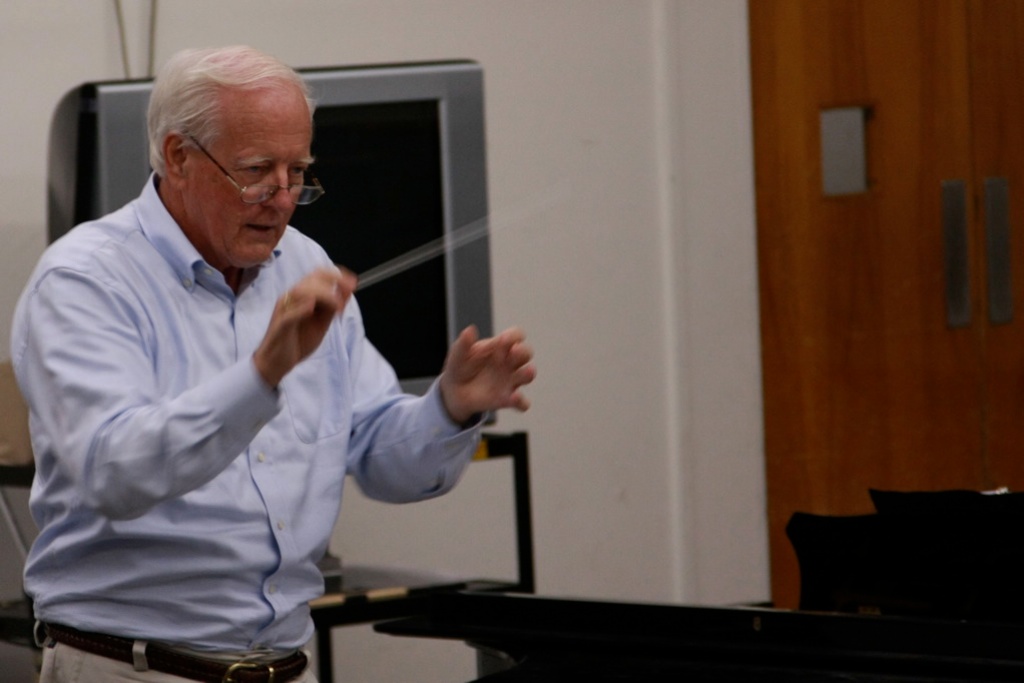
The performance is at 8pm in Schoenberg Auditorium. Yes, it’s that Schoenberg. I suspect my big, fat D major chord at the end of the piece will cause ol’ Arnold to turn in his grave…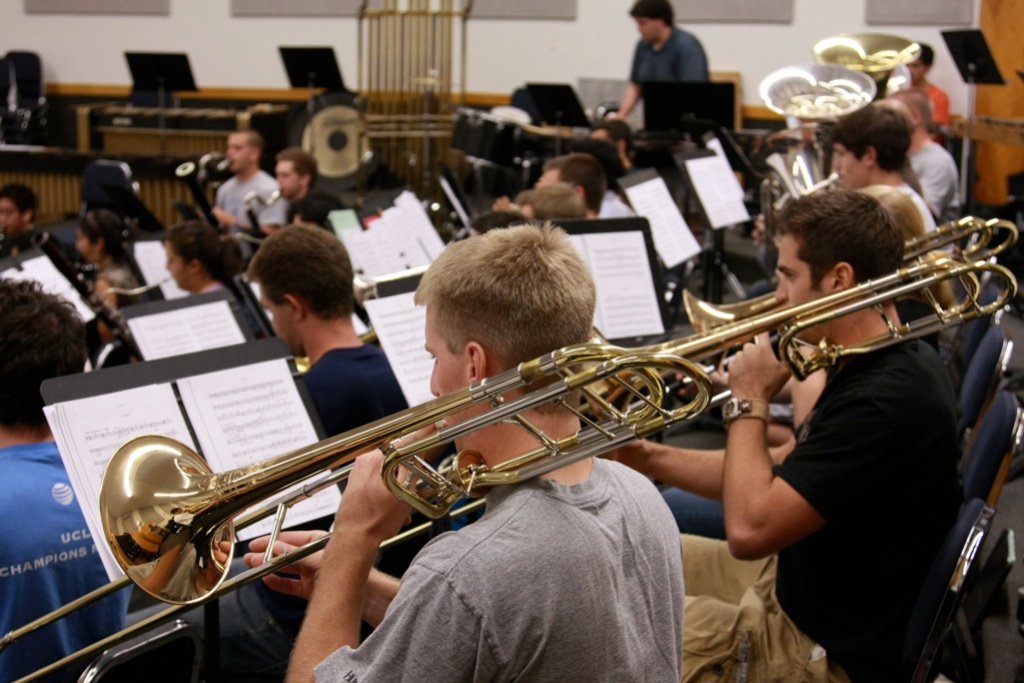
On Thursday, AEJ and I are taking a short trip to Vegas to finalize the wedding plans. While there, we’re also going to see my best friend from undergrad, Damien Bassman, who is now the percussionist for Barry Manilow.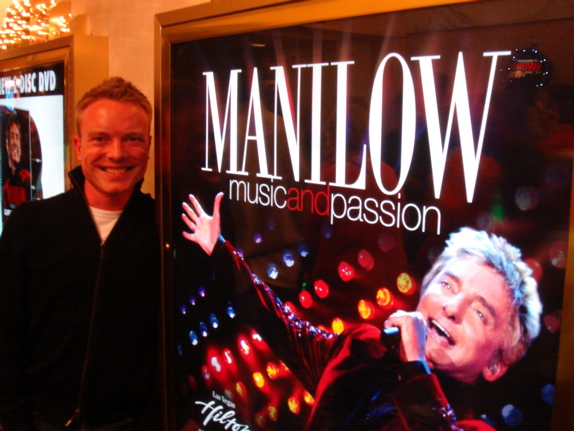
Seriously. Barry Manilow.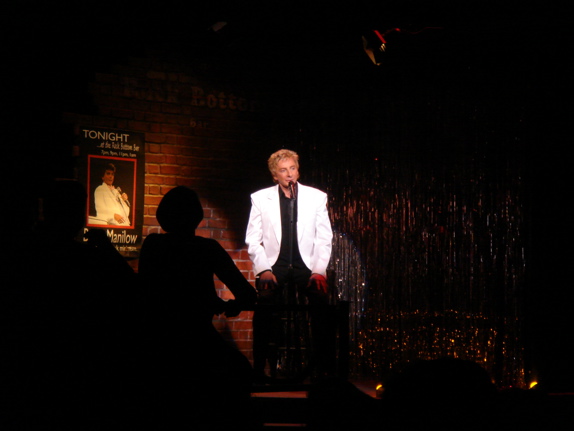
I love Barry Manilow — no joke — and now my friend is his full-time percussionist. The same friend for whom I wrote my Percussion Concerto… the same friend heard on the recording of Juba… the same friend with whom I used to stay up late on Saturday nights to watch “Grudge Match,” the short-lived knock-off of “American Gladiators.” And now he’s playing for Barry.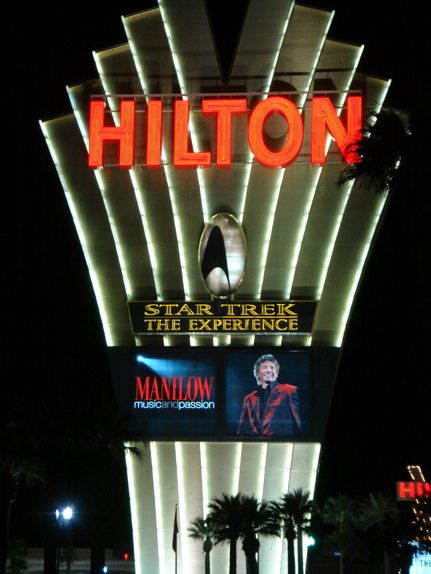
I have a feeling it’s going to be a very, very exciting trip.
November 5, 2007
Concerto review in Jersey
Lois Hicks-Wozniak was soloist for the Ridgewood Concert Band’s premiere of my Sax Concerto on Friday night in New Jersey. A friend of Lois’s, Liz Nealon, reviewed the performance in her blog. I’m linking to it because a) it’s well-written and she makes good points, b) even though it’s a blog-based review, her take is no less-valid than it would be had it run in the Star-Ledger or another big paper. Here’s the review.
Nealon raves about Lois’s performance, and even though they are friends, I don’t doubt the superlatives. Newman attended the concert and reported that Lois was the real deal, and that she had played the hell out of the piece. Newman commented on Lois’s beautiful tone throughout, as well as her technique — nailing every little alternate fingering and awkward leap. I’m excited to hear the concert recording soon.
Nealon isn’t the first person to comment about two things. First, the “Prelude,” it’s been said (not just by Nealon), is overly loud and tends to cover the soloist.
Yes, I screwed up the dynamics in the “Prelude.” I get dynamics wrong a lot, often due to my misguided trust in the MIDI playback I hear when writing the piece, and other times because I’m writing not exactly the volume I want, but the energy level I want to achieve.
I think those two reasons are connected. Frequently, when trying to get the MIDI to sound exciting, the easiest way to accomplish that is to “turn it up” — by adding a few more F’s to the dynamics. Check out the MIDI to hear what I intended.
The “Prelude” should start like shattering glass, with the crack of the slapstick, the rush of the winds, and the sparkle of the crotales and glock. (This first note also uses all of the sax “materials” — wood, felt, and metal — that will give their names and instrumentation to the movements to follow.) The entire movement is supposed to just be bright, fast, and sparkling. To get the MIDI to sound bright and sparkling, the dynamics had to be cranked to get the attacks I wanted at the front of the notes. Then I started trusting those dynamics, and before you knew it, there were 30 woodwinds playing FFF (but, to make matters more confusing, marked “lightly“) at the same time that the soloist was playing difficult runs. You can guess how that turned out. I maintain that the orchestration is fine — it’s the dynamics that are wrong. I think I was also worried that if I marked the winds at P or MP, their energy level would drop in addition to their volume, and excitement would be lost. It’s definitely something I need to revisit when I have a more extended rehearsal period with an ensemble. In the meantime, it will mean extra rehearsal time as conductors try to deal with my balance errors. I should have consulted the score for Daphnis and Chloe, since the intent was Adams + Ravel.
All of that said, I wouldn’t consider the “Prelude” a “dense wall of sound” — at least not how I hear it in my head. If it seems like that, I need to fix it. If anything, it should sound like bright, bubbling chords — like Adams in the beginning, Reich at the 1/2-way point, and a big ol’ pretty climax towards the end as it quotes the “Metal” movement to come. The “Prelude” exists to give the audience a big, yummy, sparkly, tingly mint before they’re subjected to the weirdness of “Felt.” It also gives the concerto structural cohesiveness, being constructed almost entirely from material to be heard developed in the later movements.
There has been some confusion about the “Metal” movement’s title. The expectation, especially from people who have heard very much of my music, is that “Metal” is going to be like “Turbine,” loaded with what Nealon calls “huge, percussion-driven walls of sound.” (I may trademark that.) That’s why I wanted “Metal” to go completely against that expectation and be lyrical, using the percussion extensively but primarily be aleatoric (out-of-time) and strictly for color. The title, like the other 3 middle movements, also references the orchestration of the movement — in this case, meaning metal percussion and brass (made, of course, of metal). I wanted to use the kind of scoring I used for “walls of sound” in previous pieces and use them in the opposite way here.
Although she considers the title to be a little questionable, Nealon thinks “Metal” may be a “turning point” in my work, adding “Listening to these memorable, affecting themes, I felt as though we were hearing a maturing Mackey.” (I don’t know if that’s true, but how much do I love reading her review?! How many reviews discuss the work being reviewed as it compares to other pieces by the same composer?! She says lots of other really nice things, too.)
While I think “Metal” may be my favorite movement of the concerto, don’t expect another piece like that from me again anytime soon. Writing slow music is excruciatingly difficult for me. “Metal” took much longer to write than any of the other movements, and it’s only 10 pages long. Whereas sincere, beautiful lyricism comes naturally to composers like Whitacre, for me, avoiding the pitfalls of cliche’ or sentimentality or cheese is a slow, difficult process. I can write something like the “Prelude” in three days, but “Metal” was ongoing for the entire four months I was writing the concerto, and I kept changing it until I delivered the parts. With fast, loud, rhythmic music, it’s easier to think, “I know how to do this. This’ll work fine.” But with slow, lyrical music, there’s constant second-guessing.
Nealon’s review is a great read — and not just ’cause it’s largely positive (although that doesn’t hurt). I encourage you to check it out. Hopefully I’ll have a recording of the concerto soon that I can publicly share so you can hear for yourself what she’s talking about. (Grumble, grumble.) For now, you can at least hear the MIDI of the “Prelude.”
Oh, right — we need a picture. Let’s go to the archive, shall we? Here’s a shot from Coney Island a few years ago — my favorite mullet of all time. Enjoy.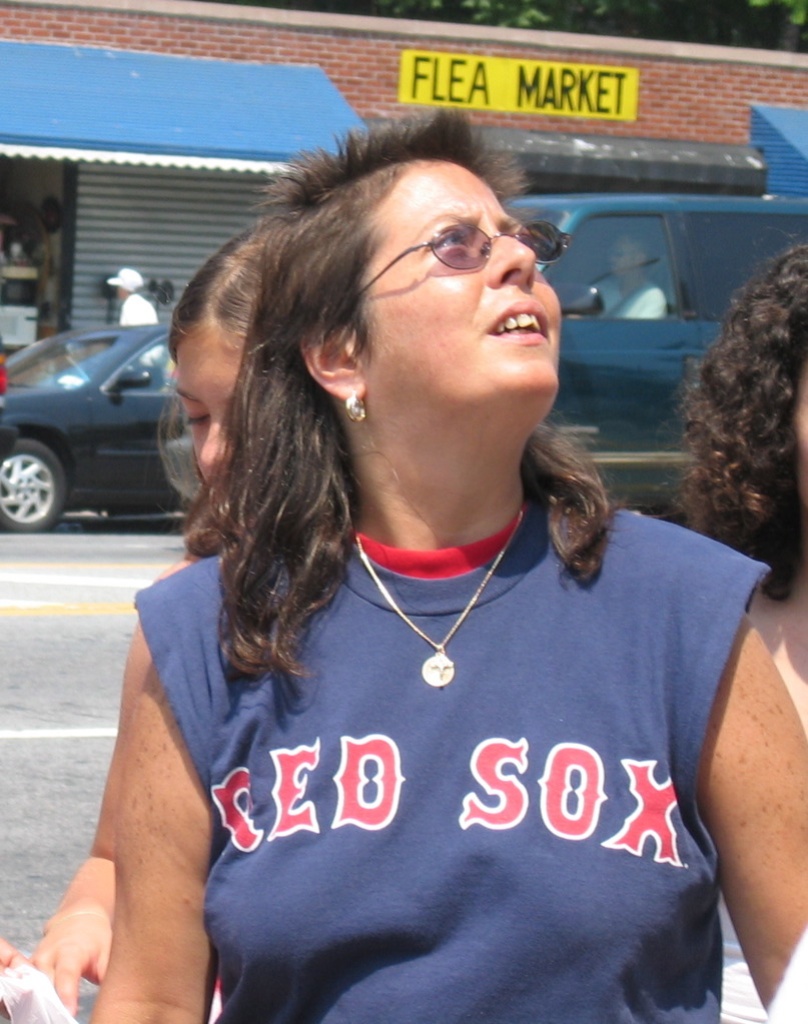
View Comments
Comments
Ew! Mullet + Red Sox fan = hideous distortion of humanity.
How did you manage to snap this picture without her noticing you? Or do you like living on the edge? ;-)
I am assuming you picked up a copy of Leopard as soon as it came out. What do you think of it? Has it been making your Finale buggy? The only thing I've noticed on my end is that whenever I quit, it gives me an error message (after Finale itself has quit), but it appears none of the files are corrupted or harmed. I could do without the Dock's stack feature, but at least the Finder is somewhat better.
Great review! Adams + Ravel--I get it. But you'll have to check on that trademark though. I've heard people talk about drum corps as a "wall of sound" for years now. You might have to fight the Blue Devils for it. :)
Couple of things:
#1: I actually liked the prelude, dynamics aside, when I heard the now-verboten-recording that was "allegedly" on the site.
#2: When you say don't expect more slow movements because they're painful for you...doesn't that mean you should deeply explore that? Maybe locked in a isolation chamber with nothing but a piano, coffee, and a stack of Erik Satie scores?
#3: I think when you write something, even when it's out of your comfort zone (see #2) that people RAVE about, perhaps you should take the hint, see if there's something really amazing waiting to be expressed.
#4: I enjoyed what I heard of the recording while it was up, but you are maturing right now (as we speak, feel it?) and I esp. liked "kingfishers". It really seems like a huge step forward for you. I personally hope you continue to move in a more lyric direction, while continuing your quirky natural style. I'll have to buy you a beer or something when you next hit Chicago, if we ever meet, that is.
#5: unrelated...I know you like a good meal out, but next time you are in chicago, consider hitting Gene and Georgetti's. pricey, but there's a reason they're considered one of the most vaunted steaks in a city famous for steaks. I want to see a HUGE pic of a steak...http://www.geneandgeorgetti.com/
bra-less mullet, too!
I agree with Will Mego about exploring that which you may not be as comfortable with. If they're raving, John, give them more.
~C
That was a great review, you should feel honored John.
Hi John: I'm a member of the DWS . I agree with the comments about the "Metal". I found it to be the most moving music in a very solid work. If you are uncomfortable about slow mvts it dosen't show. As for agonizing about composing, you aren't alone. Willam Walton, claimed he would spend an entire day working out a section and spend most of the next day erasing it. Looking forward to working with you again.
MMc
Add comment
November 2, 2007
Dallas Wind Symphony — and Ridgewood!
Tonight, Lois Hicks-Wozniak gives the second-ever performance of my Concerto for Soprano Sax and Wind Ensemble. She’ll be the soloist with the Ridgewood Concert Band, under the direction of Christian Wilhjelm. I’ve really enjoyed working with Lois (albeit only through email), and it looks like she’s going to give a hell of a performance. I wish I could be there to hear her perform, but I believe that Newman is going in my absence.
I’m still anxiously awaiting permission to post the recording of the Dallas Wind Symphony’s premiere performance of the sax concerto, but while we wait, here are some shots from that visit.
Upon my arrival in Dallas, a went to dinner with Jeff Gershman, director of bands at Texas A&M Commerce. Jeff picked a really good place in Plano. (Is Plano on top of a huge oil reserve? Good lord, how many Ferraris can one fit into a single shopping district? It was like Rodeo Drive, but with humidity.)
I had pork tenderloin.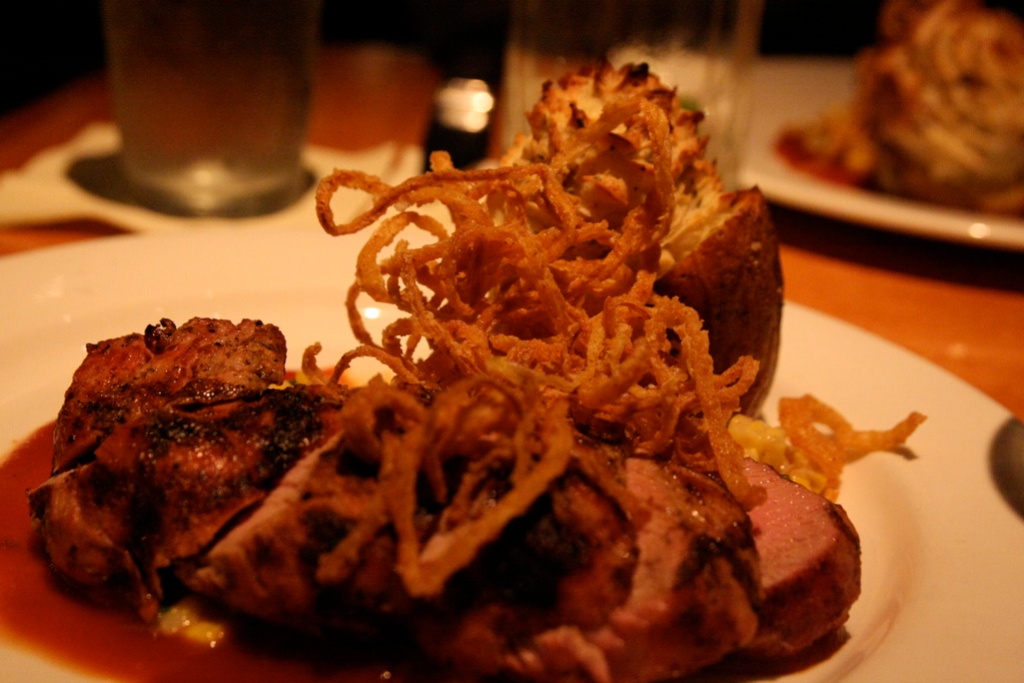
The next day, I had a six hour rehearsal with the DWS — two hours with just the winds, two hours with the whole band, and two hours with the brass and percussion. All six with Don Fabian, playing the chop-busting concerto.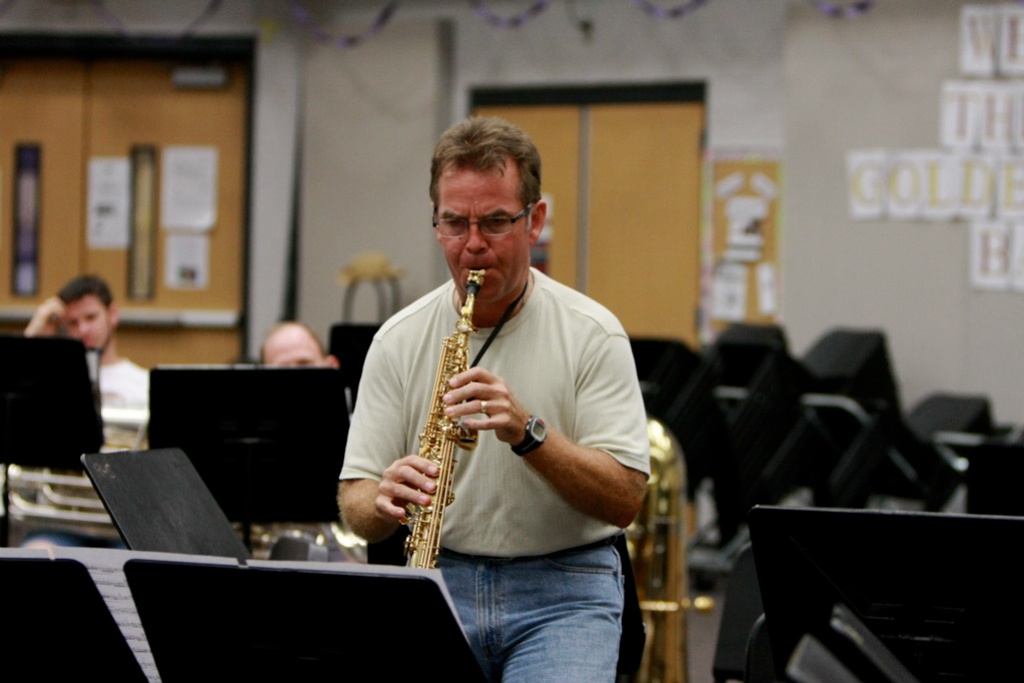
The concerto has a fairly substantial part for harp. Even so, she had some time to relax. (I challenge you to name another musician in a band who could pull off a fur coat during rehearsal.)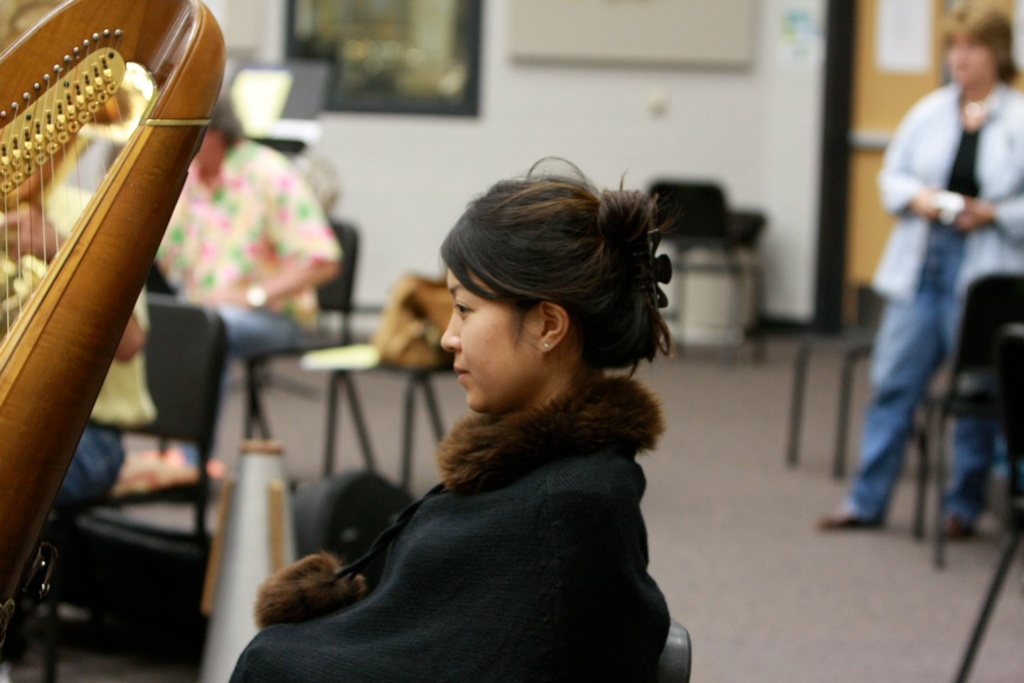
Here, Junkin bitch slaps somebody who mis-counted my 5/8 bar.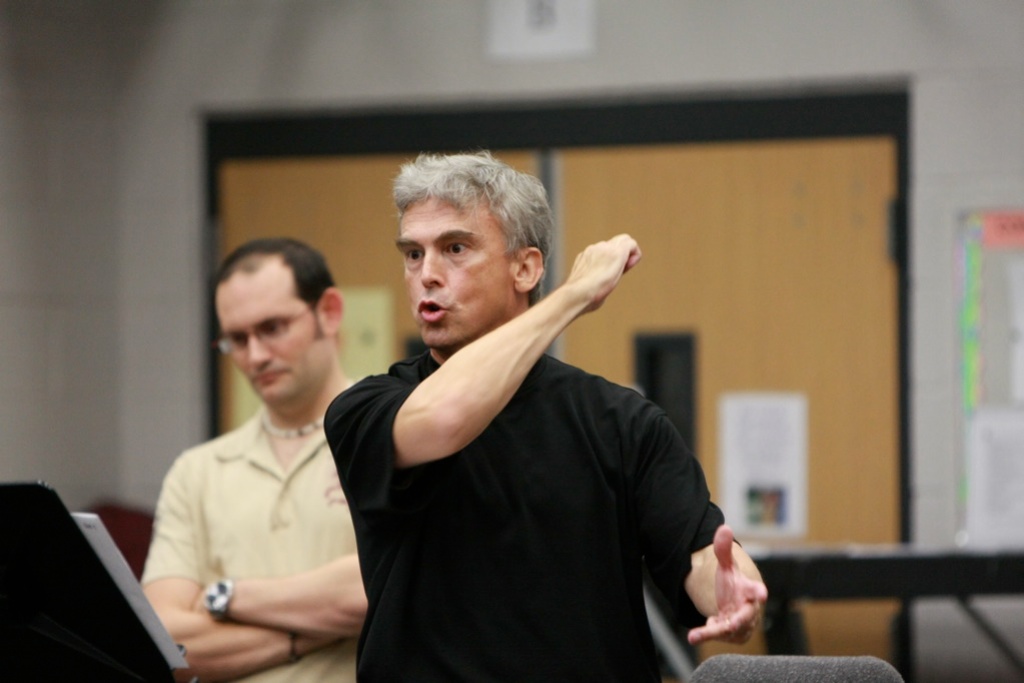
The concert also included the premiere of the band version of “Casey at the Bat” by Frank Proto. A very entertaining and bizarre piece for band and narrator.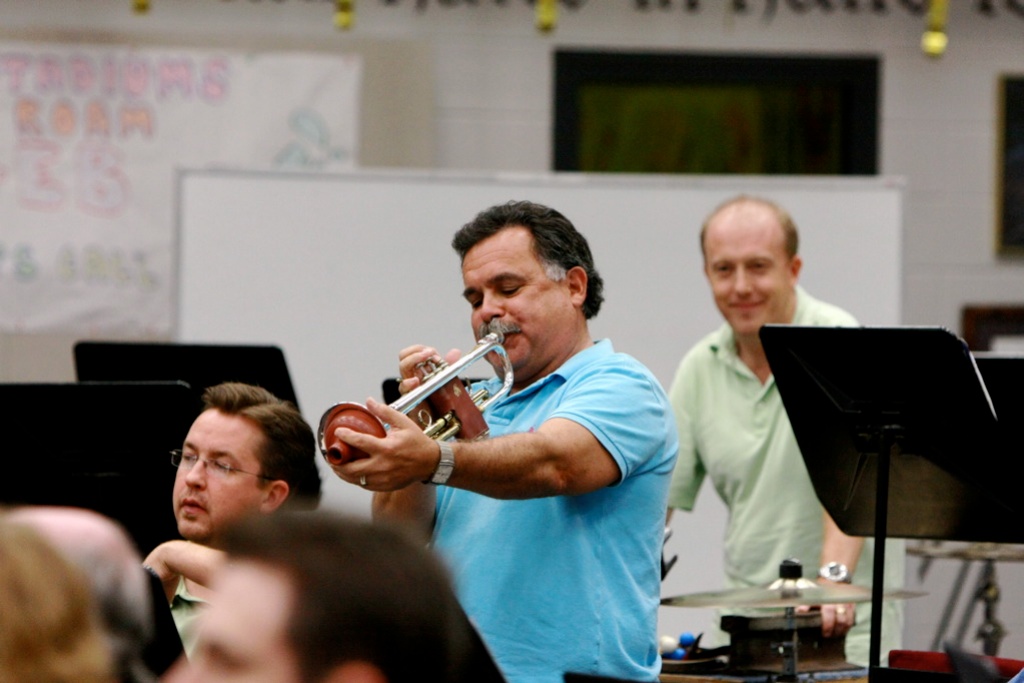
I made several goofs in the concerto — one of them being the request for all trumpet players to switch to flugelhorns for the slow movement. (That alone is not the goof.) I prefer the sound of the flugelhorn there, but never expected that a band would have access to enough flugelhorns for the entire section to make the switch. Well, the DWS actually had six flugelhorns. Towards the end of the movement, figuring that the parts would really just be played on trumpets or cornets, I marked the part “con sord.,” which means “with mute.” Trumpets have mutes — lots of ’em. (In the picture above, the player is using a plunger mute — literally a plunger.) French horns have mutes, trombones, the euphonium, even the tuba. But you know what instrument doesn’t have a common mute? The flugelhorn. So when I marked “con sord.” above the flugelhorn part, I figured it would be a trumpet playing the part anyway, and if so, I wanted it muted. What I didn’t notate was “con sord. – unless flugelhorn.”
What did the DWS players do? I mean, I asked for a mute, as far as they could tell — a mute that doesn’t really exist.
So they had flugelhorn straight mutes manufactured. Here is a picture of the trumpet section playing flugelhorns with custom straight mutes.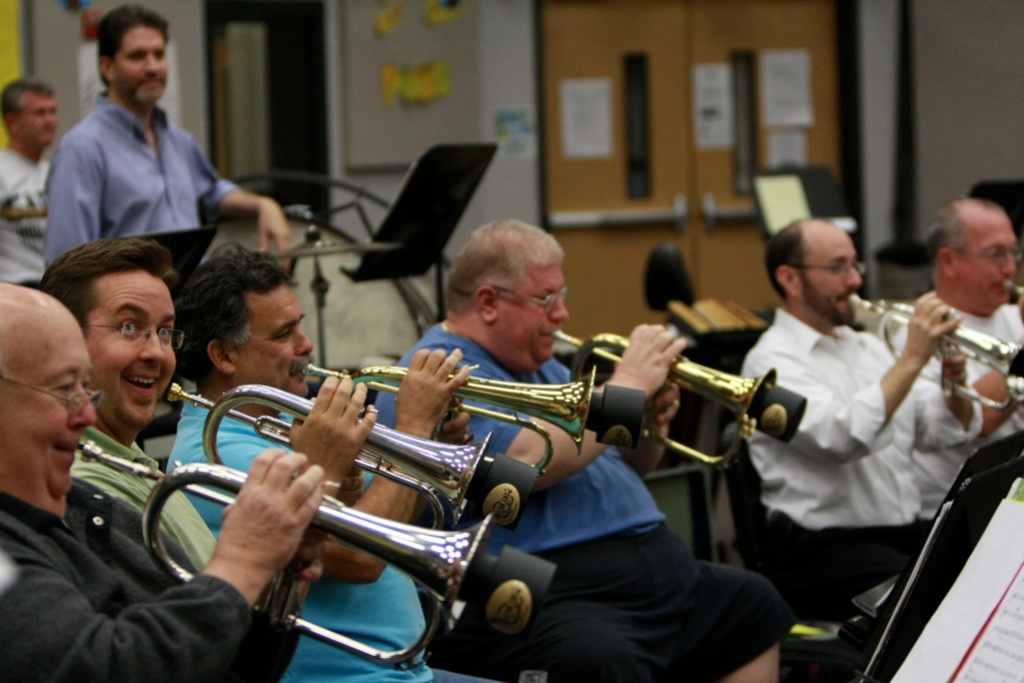
It’s a great sound, really — at least when it’s quiet. When it’s played loudly, it sounds very, very weird. Quiet, it gets a kind of very distant, barely audible drum corps sound (and I mean that in a good way). It sounds like they’re 150 feet away. You’ll hear it when I post the recording. And if other bands wish to perform the concerto the way the score indicates they “should” — with mutes in the flugelhorns — contact the DWS to arrange a rental!
The concert also included my piece “Sasparilla,” with its extensive accordion part. Here’s the wonderful Jessica Faltot, rehearsing what would be her second performance of this part. (If anybody else in the Dallas area programs this piece, I really can’t recommend Jessica highly enough.) Great sound, and so much fun to watch.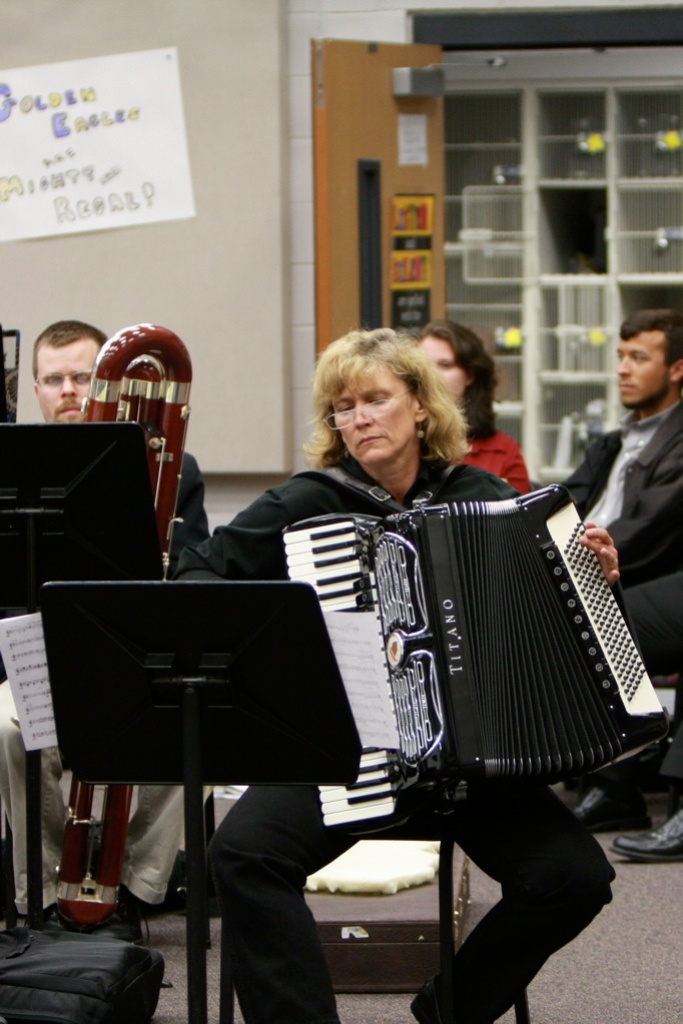
After six hours of rehearsal, we were ready for more drinks. (This one isn’t mine, but how many dirty vodka martinis can we really look at?)
Dinner that night was at a nice steak house called Chamberlain’s. I had the Kobe beef with garlic whipped potatoes.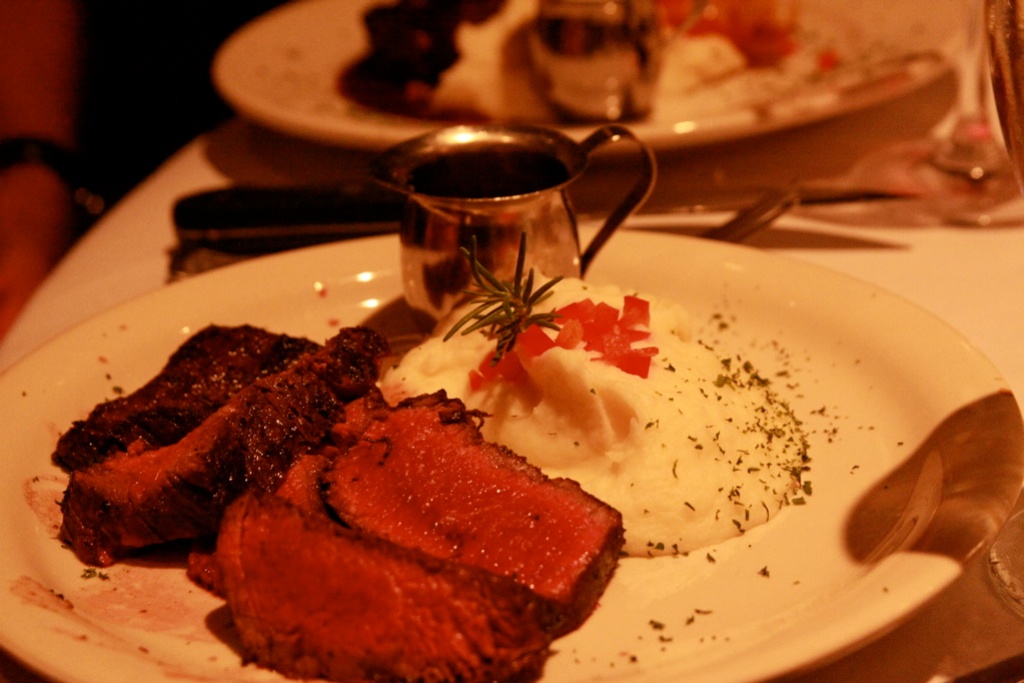
I’ve waxed on in the past about my love of cream-style corn, a love that stems from my white trash roots. (I’m just kidding, mom.) Here’s what non-canned cream corn looks like. Who knew?
Dessert was yummy. I mean, hot molten chocolate cake is always a treat.
The next day, I had a radio interview on WRR, the Dallas classical radio station.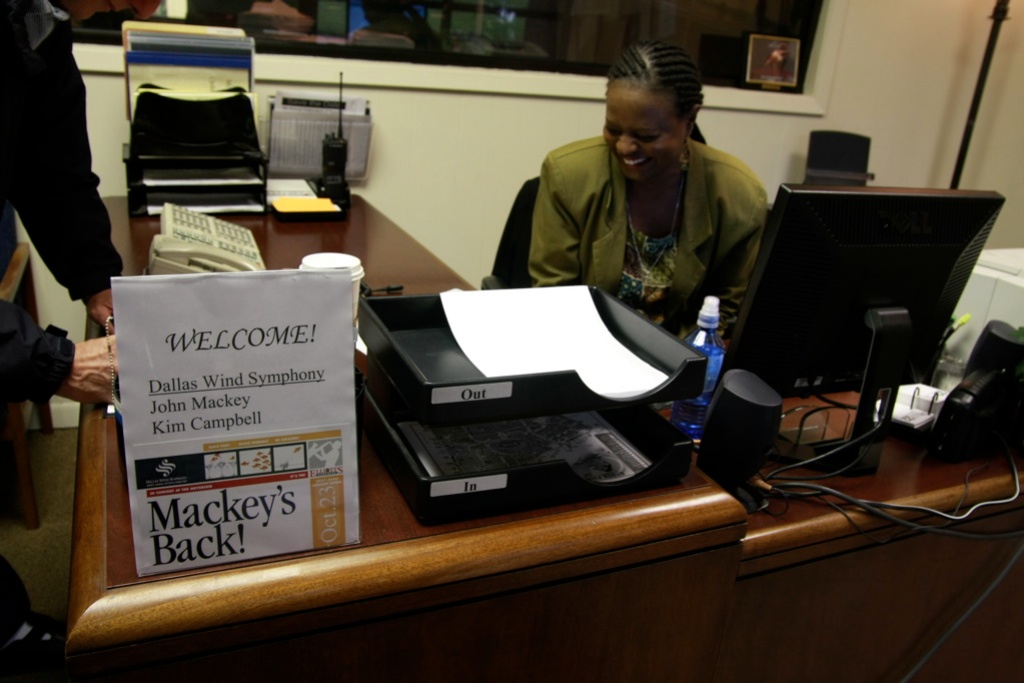
I had a 15-or-so-minute interview with Adriana Bate. The interview was a lot of fun — thanks Adriana! They gave me a recording of the interview, and I intended to post it, but now I can’t find the CD on my cluttered desk.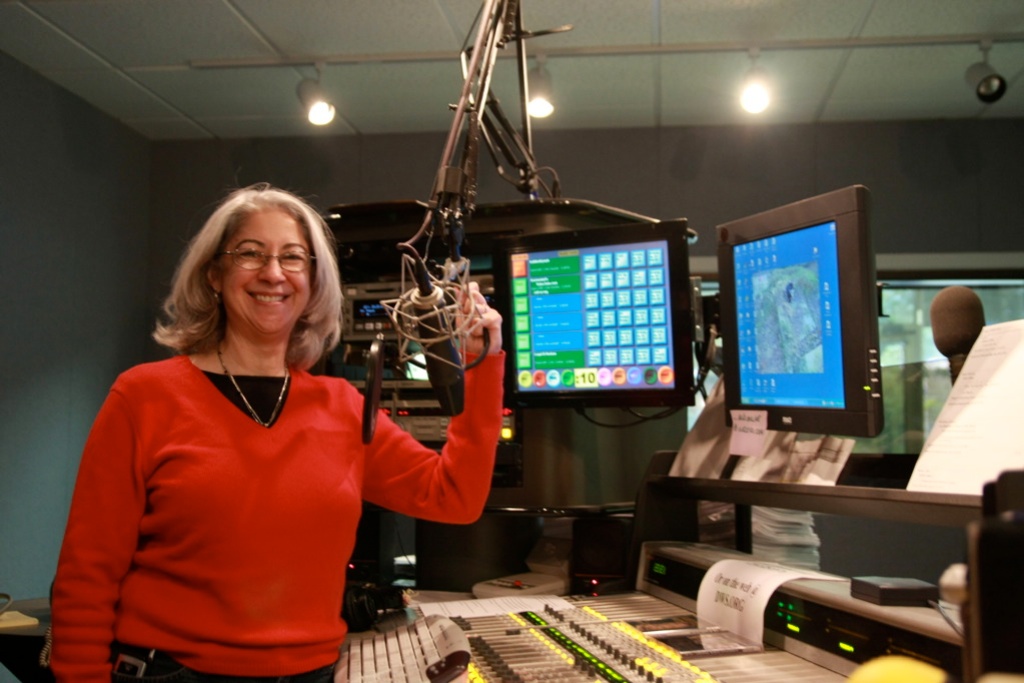
During a short break during the interview, a WRR employee came into the studio and asked for an autograph for her niece, a member of the Poteet High School Wind Ensemble (who is currently rehearsing Strange Humors for their upcoming TMEA performance). She also had me pose for a cell phone picture, proving that she had really met me. (This was flattering, but I doubt there are a lot of people making false claims that they “really met John Mackey” just to impress people. Claiming to have met AEJ — I get that. Me? Not so much.) I don’t think I’ve ever been asked for an autograph outside of a concert hall. She gets big points for flattery.
The concert was both fun and terrifying. It’s always weird to sit in the audience for a premiere, partially because it’s usually the first time I’ve heard the piece without the distraction of following the score at the same time. There’s the constant “will the audience enjoy this part?” and “does that part even work?” and “maybe I should have fixed that” and “maybe I should have gone to business school.” Add to that an audience of 1500 paying listeners, and it gets to be a bit much. I don’t have many premieres of this scale. If I did, I wouldn’t live past 35.
The players did an excellent job bringing the piece to life, and Jerry Junkin conducted the hell out of it. I hope I can post it soon so you can hear it! Stay tuned…
View Comments
Comments
Congrats, John.
they had flugelhorn mutes made special for your piece? That's soooo cool!
I think if I were ever lucky enough to get a group like DWS to play something of mine (50 years from now, say -- before I'm dead would be nice) and someone from the trumpet section looked at me and said "that mute doesn't exist" I would have a nervous breakdown and run out of the room crying and tremoring with shame, catch the next flight back to LA, and hide under my sheets for a week, and watch the Muppet Movie to calm my nerves. But then again I'm a wimp. Big points for nerve.
Can't wait to hear some of it live at Midwest.
Gus
No Mr. Mackey you shouldn't have gone to business school. If you had we'd be missing out on a LOT of great music.
View Comments
Comments
Melissa says
Am I allowed to feel super-cool that he played at our wedding?
MS
Add comment